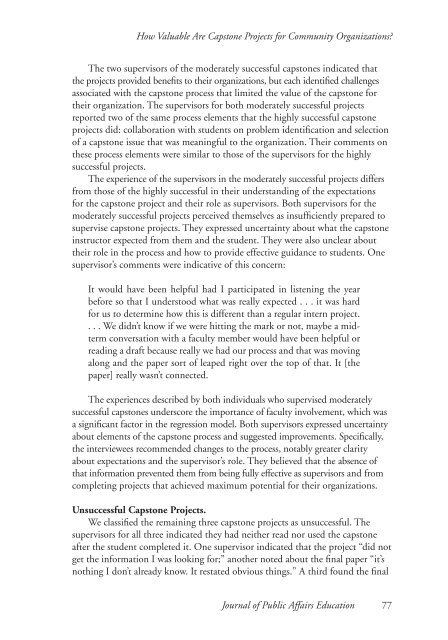Journal of Public Affairs Education
You also want an ePaper? Increase the reach of your titles
YUMPU automatically turns print PDFs into web optimized ePapers that Google loves.
How Valuable Are Capstone Projects for Community Organizations?<br />
The two supervisors <strong>of</strong> the moderately successful capstones indicated that<br />
the projects provided benefits to their organizations, but each identified challenges<br />
associated with the capstone process that limited the value <strong>of</strong> the capstone for<br />
their organization. The supervisors for both moderately successful projects<br />
reported two <strong>of</strong> the same process elements that the highly successful capstone<br />
projects did: collaboration with students on problem identification and selection<br />
<strong>of</strong> a capstone issue that was meaningful to the organization. Their comments on<br />
these process elements were similar to those <strong>of</strong> the supervisors for the highly<br />
successful projects.<br />
The experience <strong>of</strong> the supervisors in the moderately successful projects differs<br />
from those <strong>of</strong> the highly successful in their understanding <strong>of</strong> the expectations<br />
for the capstone project and their role as supervisors. Both supervisors for the<br />
moderately successful projects perceived themselves as insufficiently prepared to<br />
supervise capstone projects. They expressed uncertainty about what the capstone<br />
instructor expected from them and the student. They were also unclear about<br />
their role in the process and how to provide effective guidance to students. One<br />
supervisor’s comments were indicative <strong>of</strong> this concern:<br />
It would have been helpful had I participated in listening the year<br />
before so that I understood what was really expected . . . it was hard<br />
for us to determine how this is different than a regular intern project.<br />
. . . We didn’t know if we were hitting the mark or not, maybe a midterm<br />
conversation with a faculty member would have been helpful or<br />
reading a draft because really we had our process and that was moving<br />
along and the paper sort <strong>of</strong> leaped right over the top <strong>of</strong> that. It [the<br />
paper] really wasn’t connected.<br />
The experiences described by both individuals who supervised moderately<br />
successful capstones underscore the importance <strong>of</strong> faculty involvement, which was<br />
a significant factor in the regression model. Both supervisors expressed uncertainty<br />
about elements <strong>of</strong> the capstone process and suggested improvements. Specifically,<br />
the interviewees recommended changes to the process, notably greater clarity<br />
about expectations and the supervisor’s role. They believed that the absence <strong>of</strong><br />
that information prevented them from being fully effective as supervisors and from<br />
completing projects that achieved maximum potential for their organizations.<br />
Unsuccessful Capstone Projects.<br />
We classified the remaining three capstone projects as unsuccessful. The<br />
supervisors for all three indicated they had neither read nor used the capstone<br />
after the student completed it. One supervisor indicated that the project “did not<br />
get the information I was looking for;” another noted about the final paper “it’s<br />
nothing I don’t already know. It restated obvious things.” A third found the final<br />
<strong>Journal</strong> <strong>of</strong> <strong>Public</strong> <strong>Affairs</strong> <strong>Education</strong> 77



